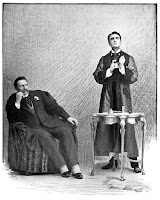A new year, a renewed determination to improve my writing. I’ve always thought of myself as more of a craftsman than an artist, but even a well-written story isn’t enough—what really holds on to a reader is the characters that populate it. I get that. I’m just not sure how to pull it off.
All writers know that the key to creating a great character is baring that character’s soul. A protagonist has to first possess and then be able to express deep emotional issues, problems, torturous desires, frustrations and despairs. They must have profound secrets they are desperate to keep or desperate to share. They must have emotional crutches and psychological hang-ups. They have to open a mental vein and leave a meandering trail of agony through every page of your book. This is how the reader comes to identify with them so deeply that they can’t put the book down without finding out what happens to that character, their pain so viscerally real to the reader because it’s so viscerally real to the writer.
My problem is I can’t do that.
I hate baring my soul, to be honest, whether in person or by proxy. I don’t think I ever have and I don’t have any plans to. Whatever intense desires and frustrations I may possess, I want to keep locked right here in my own little head. I don’t find writing cathartic—I’m not sure I should—and I have a problem expressing emotion. Possibly because over thirty years of marriage to a short-tempered man convinced me it was easier not to have feelings than to have them routinely battered, but possibly because I just don’t have any. Is that okay, do you think?
 I come from a stoic family. My father was a very understated person and we took our cues from him. My mother was easy-going and not given to drama. I despise crying in public. I despise crying at all, frankly, it gives me a sinus headache. I purposely do not see movies where somebody dies (unless it’s by gunshot or a good-sized butcher knife). I don’t spend time with any storyline that involves pets, either in a good way or not-so-good way. I have no interest in exploring my dark side or my light side or any other side at all except the one that goes to work and gets paid, eats chocolate and goes on vacation.
I come from a stoic family. My father was a very understated person and we took our cues from him. My mother was easy-going and not given to drama. I despise crying in public. I despise crying at all, frankly, it gives me a sinus headache. I purposely do not see movies where somebody dies (unless it’s by gunshot or a good-sized butcher knife). I don’t spend time with any storyline that involves pets, either in a good way or not-so-good way. I have no interest in exploring my dark side or my light side or any other side at all except the one that goes to work and gets paid, eats chocolate and goes on vacation. Apparently, I have been completely crippled by a happy childhood. I truly don’t have those depths of trauma and agony to draw on, with which to create my characters. Not that I would change my upbringing if I could, of course—but it’s a real handicap as a writer.
 So instead of me developing great depths of emotion and learning to share them, can’t we please go back to the golden age of detective fiction where completely disinterested professional investigators looked into crimes because they found them interesting, or fun, or something to do and not because they were working out some deep-seated childhood trauma? Ellery Queen’s estranged mother or ex-lover never got themselves murdered. A psychotic serial killer didn’t torture Lord Peter Whimsey for days on end. Archie Goodwin took care not to get too attached to any alluring client of Mr. Wolfe’s. Miss Marple never felt so much as the need to raise her voice. Why must all our characters today be so mortally wounded? What was wrong with readers enjoying the puzzle more than the personalities?
So instead of me developing great depths of emotion and learning to share them, can’t we please go back to the golden age of detective fiction where completely disinterested professional investigators looked into crimes because they found them interesting, or fun, or something to do and not because they were working out some deep-seated childhood trauma? Ellery Queen’s estranged mother or ex-lover never got themselves murdered. A psychotic serial killer didn’t torture Lord Peter Whimsey for days on end. Archie Goodwin took care not to get too attached to any alluring client of Mr. Wolfe’s. Miss Marple never felt so much as the need to raise her voice. Why must all our characters today be so mortally wounded? What was wrong with readers enjoying the puzzle more than the personalities? What do you think? Must protagonists have a multitude of intense layers (what I call STP—the Standard Tragic Past), or can they simply be clever detectives?
I’m, um, asking for a friend.



















































I think the Standard Tragic Past comes about in detective fiction, because it gives them something to investigate, and adds the personal motivation as to why they continue, doggedly, to dig into the case (long after sane people would back off) when people are trying left and right to kill them. Without that, you'd have to wonder why they persist. That being said, those stories can get old. It's been done. (Yes, I've done it, too.) But it works in detective fiction. And it works in Harry Potter. (Talk about tragic past. Rogue wizard kills his parents, he's locked in the space beneath the stairs for years, only to come out to do slave labor for the family who took him in–and clearly doesn't want him there, etc.) It provides motivation. But in the wrong hands, it could be lazy motivation. In some cases, cliché. So it takes a skilled writer to tell a good enough story where they can look past what is clearly a detective trope, but it also takes a good writer to tell a good enough story without such a trope. That's the beauty of books. We can do what we want as long as we do it well.
When we attend author conferences we often hear advice about how we should be creating characters who are "flawed, emotionally conflicted, then redeemed" — as you indicate in your thoughtful post, Lisa. But thinking about some of my favorite characters like the detective Hercule Poirot or Jessica Fletcher, author-crime solver in the Murder-She-Wrote series — they had none of those characteristics. So, I say – write what you truly want and are inspired to write. You have had such success with your great thrillers — keep it up in your own style. They're great stories!
Back in the day when I was married to a detective novelist, I enjoyed the history of the form … Dashiel Hammett's work so distant as he worked the dark alleys and the criminal underbelly. Then Ross Macdonald who took the detective into the homes of ordinary people where extraordinary crimes happened. He always said that if you turned Lew Archer sideways, he would vanish. And then finally Dennis Lynds, aka Michael Collins et al, who used cinema verite almost exclusively, his detective a camera focused on the other characters. It seems to me there are so many ways to approach a story, and the good ways are the ones that people enjoy. You rock, Lisa!
I'm a believer in the old saw: If the character's crying, the readers aren't. Characters can feel but not show grand emotions. I'd much rather get to know their thought processes, what about the situation rends their heart, angers them, drives them to stand up for the little guy. As an editor, that's the direction I urge my writers toward.
I don't like to write about my personal emotions as they occur but it's fine to mine an old emotion and pretend it happened to someone else. I write about crimes that really happened to and by my clients and my protags vow to get the bullies based on what I know of personal bullies, but I want to disguise who they were (cause some are still alive and are sooo vindictive). I don't believe routing out the real motives quiets the inner demons. It's just a scab that never heals if you do that. Laurie Hernandez
Almost every book you read these days has a protagonist that is "damaged goods." Something tragic has caused them to see the world in a very negative light, and/or they have issues to overcome (abuse, PTSD, betrayal, you name it). I like the idea of a smart, savvy detective who isn't emotionally crippled in some way. That said, character drives the novel, so there has to be something that drives them and keeps them from walking away from the challenge. Having a job to do isn't quite enough. And so, we all search for that one thing that motivates our protagonist. Funny, though, I had a very "Leave it to Beaver" childhood myself and I'll never forget a good friend of mine telling me one day at critique when I was lamenting not relating to some tragic past that drove one of his characters–Goff, you're just too white-bred. It begs the question, can we write from a perspective we can't completely relate to?